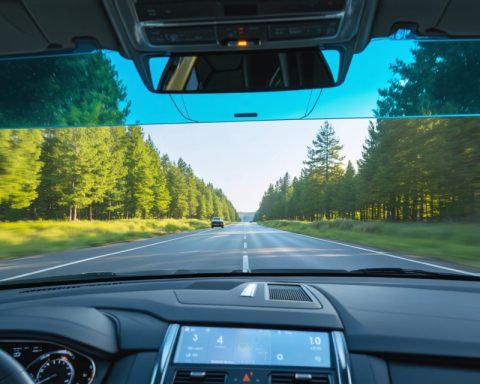- Luminar Technologies is leading advancements in autonomous driving with cutting-edge LiDAR technology, enhancing vehicle perception and response.
- Strategic partnerships, notably with Volvo, are pivotal in integrating advanced safety features and driving the industry toward fully autonomous vehicles.
- Luminar’s global expansion includes significant deals with Japanese OEMs, broadening their influence in a key market for autonomous technology.
- The upcoming launch of Halo LiDAR in 2026 is set to revolutionize assisted driving experiences, reinforcing Luminar’s commitment to innovation.
- Luminar’s technology contributes to environmental benefits through traffic optimization, reduced emissions, and improved vehicle efficiency.
- With a focus on safety, sustainability, and efficiency, Luminar is a trailblazer in the autonomous vehicle industry, driving toward a smarter future.
Luminar Technologies is not merely keeping pace with the evolving era of autonomous driving; it is crafting the road ahead. Pioneering advanced LiDAR technology, Luminar is revolutionizing how vehicles sense and respond to their environment, ensuring a safer tomorrow for drivers and passengers alike. As the self-driving revolution gains traction, Luminar’s innovations are becoming the backbone of a smarter, safer transportation system.
In a bold collaborative stride, Luminar’s partnership with Volvo marks a significant milestone. By integrating their cutting-edge LiDAR technology, vehicles can now perceive their surroundings with unparalleled accuracy, enhancing driver-assistance systems and paving the way for fully autonomous cars. As Luminar innovates, they redefine automotive safety standards, positioning themselves as a beacon in the automotive industry.
The journey doesn’t stop at technology. Luminar’s strategic expansion includes key deals with prominent Japanese original equipment manufacturers, expanding their global reach into a region primed for autonomous advancement. Amid leadership transformations, Luminar’s strategic direction remains strong, promising continued progress and innovation.
Set to make its debut in 2026, Luminar’s Halo LiDAR is more than just a product; it’s a leap into the future. This sophisticated device promises to elevate assisted driving experiences, underscoring Luminar’s relentless quest for innovation.
Beyond technology, Luminar’s contributions ripple through environmental, societal, and economic realms. Vehicles equipped with LiDAR can reduce emissions by optimizing traffic flow and boosting efficiency. By enhancing safety and efficiency, Luminar is poised not only to shape autonomous mobility but also to advance a sustainable, high-tech future.
Luminar Technologies is at the forefront of a pivotal shift, charting a course for the autonomous vehicle industry that prioritizes safety, sustainability, and efficiency. As the world embraces this evolution, Luminar stands as a testament to motivated innovation, championing a brighter, smarter future for all.
You Won’t Believe How Luminar Technologies Is Shaping the Future of Autonomous Vehicles!
Key Aspects of Luminar Technologies’ Impact on Autonomous Vehicles
1. How does Luminar’s LiDAR technology enhance vehicle safety and efficiency?
Luminar’s LiDAR technology provides unprecedented environmental sensing with high-resolution mapping and speed, enabling vehicles to detect and respond to obstacles swiftly and accurately. This precision enhances safety by minimizing the risk of accidents, significantly improving driver-assistance systems, and advancing the transition to fully autonomous vehicles. Moreover, the technology optimizes traffic flow, thereby reducing vehicle emissions and promoting efficiency.
2. What are the strategic movements behind Luminar’s expansion into international markets, particularly in Japan?
Luminar is strategically partnering with Japanese original equipment manufacturers (OEMs) to tap into a market that is ripe for autonomous vehicle technology. Japan’s focus on technological advancement and sustainable solutions aligns with Luminar’s mission, providing an ideal opportunity to expand their global footprint. These partnerships are essential for adapting their technology to varying regional requirements and enhancing global product penetration.
3. What are the environmental and societal benefits of Luminar’s advancements?
The adoption of Luminar’s LiDAR in vehicles contributes to a reduction in traffic congestion and emissions, which benefits the environment by improving air quality. On a societal level, the enhanced safety features reduce the likelihood of accidents, thereby preserving lives and reducing associated healthcare costs. Additionally, by facilitating greater independence for individuals through autonomous vehicles, Luminar can positively impact mobility options for those unable to drive manually.
Market Insights and Predictions
– Market Forecasts: The LiDAR market is expected to grow significantly, driven by increased demand for autonomous vehicles. Luminar is well-positioned to capitalize on this growth due to its partnerships and innovative technology.
– Security Aspects: Luminar’s technology includes advanced security measures to protect data integrity and privacy in connected vehicles, essential in a digital age where data breaches are a concern.
– Sustainability: By enhancing vehicle efficiency and reducing emissions, Luminar’s innovations contribute to a more sustainable future, aligning with global environmental goals.
Predictions for Luminar’s Future
As Luminar launches its Halo LiDAR in 2026, it is anticipated to further revolutionize the vehicle sensing domain. The integration of this advanced technology is likely to become industry standard, setting new benchmarks for safety and efficiency in autonomous vehicle systems.
For more information, visit the official Luminar Technologies website.









